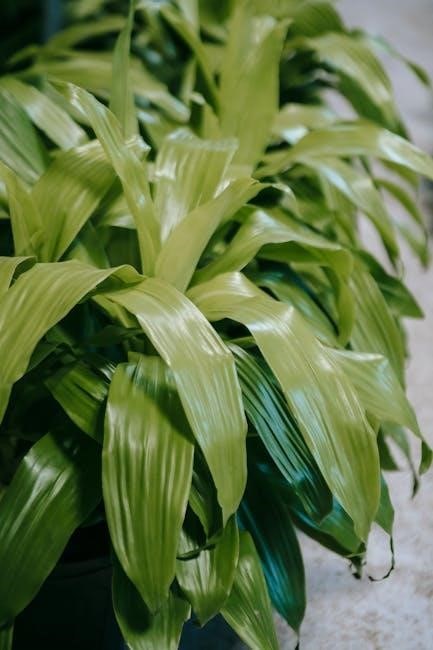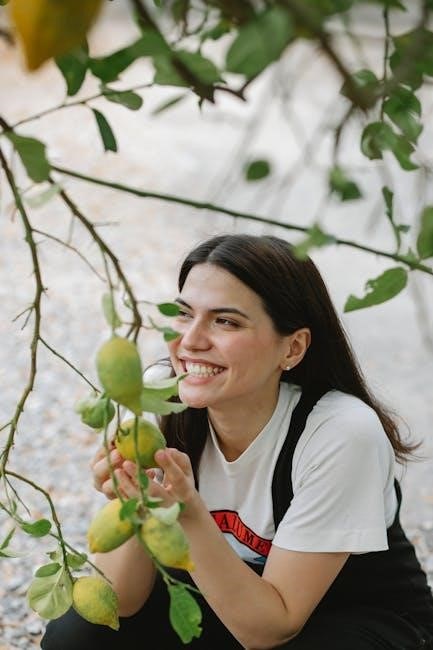Zoulfa Katouh’s debut novel, As Long as the Lemon Trees Grow, is a poignant and powerful tale set during the Syrian Revolution, following Salama Kassab, a young pharmacy student navigating the horrors of war, loss, and love. The book is celebrated for its vivid storytelling, emotional depth, and exploration of hope, resilience, and family bonds amidst chaos. A must-read for fans of historical fiction and contemporary literature.
Overview of the Book
Zoulfa Katouh’s As Long as the Lemon Trees Grow is a heart-wrenching and emotional tale set against the backdrop of the Syrian Revolution. The story follows Salama Kassab, a young pharmacy student, as she navigates the chaos of war, loss, and love. The novel vividly captures the horrors of the conflict while exploring themes of hope, resilience, family bonds, and the enduring strength of the human spirit. With lyrical prose and a compelling narrative, it offers a poignant glimpse into the lives of those affected by the Syrian Civil War, making it a must-read for fans of historical and contemporary fiction.
Historical Context of Syria
The novel is set against the backdrop of the Syrian Revolution, which began in 2011 as part of the Arab Spring. Protests against the regime escalated into a brutal civil war, marked by widespread violence, displacement, and human rights abuses. The conflict devastated Syria, leading to the rise of extremist groups like ISIS and a massive humanitarian crisis. The book captures the chaos and resilience of Syrians during this period, offering a personal and emotional perspective on the war’s impact on ordinary lives and the enduring hope for freedom and reconstruction.
Author Background: Zoulfa Katouh
Zoulfa Katouh is a Syrian-American debut author renowned for her haunting storytelling and emotional depth in her debut novel, ‘As Long as the Lemon Trees Grow.’
Biography of Zoulfa Katouh
Zoulfa Katouh is a Syrian-American author, known for her deeply moving debut novel, As Long as the Lemon Trees Grow. Her work captures the resilience and hope of the Syrian people during the civil war. Katouh’s personal experiences and connection to her homeland heavily influence her writing, creating a vivid and emotional portrayal of life in war-torn Syria. Her storytelling has been praised for its lyrical prose and ability to weave personal and political narratives seamlessly.
Her Writing Style and Influences
Zoulfa Katouh’s writing is characterized by lyrical prose and emotional depth, blending personal and political narratives seamlessly. Her debut novel, As Long as the Lemon Trees Grow, reflects her deep connection to Syria and its people, drawing inspiration from the resilience and hope amidst war. Katouh’s storytelling is influenced by her Syrian heritage and experiences, creating a vivid and heartfelt portrayal of life during the Syrian Civil War. Her unique voice and ability to weave historical context with personal stories have earned her acclaim, making her a compelling new talent in contemporary literature.

Plot Summary
Set during the Syrian Revolution, As Long as the Lemon Trees Grow follows Salama Kassab, a pharmacy student turned hospital volunteer in war-torn Homs, as she navigates loss, love, and hope amidst chaos.
Protagonist: Salama Kassab
Salama Kassab is a young pharmacy student whose life is upended by the Syrian Revolution. Volunteering at a hospital in Homs, she witnesses the horrors of war while navigating personal loss and newfound love. Her journey highlights resilience, hope, and the strength of the human spirit. Through her eyes, the story unfolds, showcasing her growth from a sheltered student to a determined individual fighting for survival and justice. Salama’s story is a testament to the enduring power of love, family, and hope amidst unimaginable adversity.
Setting: The Syrian Revolution
The Syrian Revolution forms the backdrop of Zoulfa Katouh’s poignant novel, immersing readers in the chaos and destruction of war-torn Syria. The story unfolds in cities like Homs, where hospitals become battlegrounds and ordinary citizens face unimaginable horrors. Amidst the rubble and loss, the setting reflects the resilience of the Syrian people, their culture, and their hope for freedom. The revolution’s brutality contrasts with moments of beauty, such as the symbolic lemon trees, which represent enduring life and the longing for a peaceful past. This vivid portrayal brings the harsh realities of war to life.
Key Plot Points and Conflict
Salama Kassab’s journey from a pharmacy student to a hospital volunteer in Homs forms the core of the narrative. As the Syrian Revolution escalates, she faces the brutal realities of war, including the disappearance of her brother and the fragmentation of her family. The story explores her internal conflict between hope and despair, as well as her blossoming romance with Kenan, a fellow revolutionary. The lemon trees symbolize the enduring spirit of her homeland, even as the war rages on. The novel’s tension arises from her struggle to survive, protect her loved ones, and hold onto her humanity amidst unimaginable loss and destruction.
Themes Explored in the Book
Hope and resilience shine through Salama’s journey, as she navigates love, loss, and war. The novel explores family bonds, survival, and sacrifice, highlighting the strength of the human spirit in crisis.
Hope and Resilience
Hope and resilience are central themes in Zoulfa Katouh’s novel, as Salama Kassab navigates the devastation of war-torn Syria. Despite losing her sense of security and future, Salama finds strength in her community and the enduring presence of lemon trees, which symbolize hope and continuity. Her journey highlights the human capacity to persevere even in the face of unimaginable loss, offering a powerful message about the resilience of the human spirit. The novel underscores how hope, though fragile, can sustain individuals and communities through their darkest hours.
Family and Community Bonds
Family and community bonds are a cornerstone of Salama’s story in Zoulfa Katouh’s novel. Her relationships with her parents and brother provide emotional support amidst the chaos of war. The community’s collective resilience and solidarity are portrayed through their shared struggles and acts of kindness. These bonds not only offer comfort but also serve as a source of strength, enabling Salama and others to navigate the harsh realities of their environment. The novel illustrates how such connections are vital for survival and maintaining hope during times of crisis.
Love Amidst War
The novel beautifully portrays the blossoming romance between Salama and Kenan, set against the backdrop of war-torn Syria. Their love story, marked by tender moments and shared hopes, offers a glimmer of light in the darkness. The relationship underscores the human capacity for connection and intimacy even in the most dire circumstances. Through their bond, Katouh highlights the enduring power of love as a source of strength and solace, reminding readers of the beauty that persists amidst chaos and loss. This poignant portrayal enriches the narrative, making it deeply emotional and relatable.
Survival and Sacrifice
The novel vividly portrays the struggle for survival in war-torn Syria, where characters like Salama Kassab risk everything to care for others. volunteering at a hospital in Homs, Salama faces unimaginable horrors, yet her determination to help embodies the spirit of sacrifice. The narrative highlights how ordinary people endure extraordinary hardships, sacrificing their safety and well-being for the greater good. Through these acts of courage, Katouh underscores the resilience of the human spirit and the moral choices that define us in the face of overwhelming adversity. Survival becomes a testament to both personal and collective strength.
Reception and Awards
As Long as the Lemon Trees Grow received critical acclaim, being named an Amazon Best Book of the Month and shortlisted for the British Book Awards.
Critical Acclaim and Reviews
Critical Acclaim and Reviews
As Long as the Lemon Trees Grow has garnered widespread critical acclaim for its powerful storytelling and emotional depth. Reviewers praise Zoulfa Katouh’s lyrical prose and her ability to weave a poignant tale of hope and resilience. The novel has been described as a “love letter to Syria” and compared to works like The Book Thief and Salt to the Sea. Critics highlight its vivid portrayal of life during the Syrian Revolution, with many calling it a “must-read” for its raw honesty and emotional impact. The book has also been endorsed by award-winning authors, further cementing its literary significance.
Awards and Nominations
Zoulfa Katouh’s As Long as the Lemon Trees Grow has received notable recognition, including being shortlisted for the British Book Awards Discover Book of the Year. The novel has also been named an Amazon Best Book of the Month, showcasing its literary impact. Acclaimed author Elizabeth Laird praised it as “an important book everyone should read.” These accolades highlight the book’s emotional depth and its ability to resonate with readers, further solidifying its place in contemporary literature. The nominations underscore its relevance and the power of its storytelling.
Impact on Readers
Zoulfa Katouh’s As Long as the Lemon Trees Grow has left a profound impact on readers, offering a deeply emotional and personal connection to the story of Salama Kassab. The novel’s vivid portrayal of hope, loss, and resilience resonates universally, creating a sense of empathy and understanding for the Syrian people’s struggles. Readers have praised the book for its ability to humanize the conflict, fostering a deeper connection to the characters and their experiences. The story’s emotional depth and authenticity have made it a memorable read, inspiring reflection on the strength of the human spirit.
Historical Context of the Syrian Civil War
The Syrian Civil War began in 2011 with peaceful protests against the regime, escalating into a brutal conflict involving government forces, rebels, and international factions. The war caused massive displacement, loss of life, and widespread devastation, shaping the backdrop of Zoulfa Katouh’s novel, which vividly portrays the resilience and humanity of Syrians amidst unparalleled chaos and destruction.
Causes and Key Events
The Syrian Civil War, beginning in 2011, stemmed from peaceful protests against President Bashar al-Assad’s regime, demanding political reform and freedom. The government’s violent crackdown escalated tensions, leading to widespread rebellion. Key events include the rise of rebel groups, foreign intervention from Russia and Iran, and the emergence of extremist groups like ISIS. The war intensified with chemical attacks, sieges, and mass displacements, creating a humanitarian crisis. These events form the backdrop of Zoulfa Katouh’s novel, highlighting the resilience and struggles of Syrians amidst unimaginable chaos and devastation.
Humanitarian Impact
The Syrian Civil War has caused unparalleled human suffering, with millions displaced, countless casualties, and infrastructure destroyed. Civilians, including healthcare workers like Salama, face immense risks, while families are torn apart. The book highlights the emotional toll of war, showcasing resilience amid loss. The humanitarian crisis remains severe, with limited access to basic necessities and medical care. Zoulfa Katouh’s narrative underscores the devastating realities of war, offering a poignant reflection on the human cost and the enduring hope for peace and rebuilding in Syria.
Cultural Significance in the Book
Zoulfa Katouh’s As Long as the Lemon Trees Grow is a cultural testament to Syria’s rich heritage, weaving traditional values, family bonds, and love into the narrative. The lemon trees symbolize resilience and hope, reflecting the enduring spirit of the Syrian people. By portraying Salama’s journey, the novel preserves the cultural identity of a nation amidst war, offering a bridge between Syria’s past and its uncertain future. This cultural depth enriches the story, making it a heartfelt tribute to a nation’s history and its people’s unyielding spirit.

Symbolism in the Novel
The lemon trees symbolize resilience and enduring love, reflecting Syria’s harsh realities and its people’s hope amidst war and loss, central to the story’s emotional core.
The Lemon Trees as a Symbol
The lemon trees in Zoulfa Katouh’s novel are a potent symbol of resilience, hope, and enduring love. They represent the harsh realities of loss and the tender roots of love amidst war. The trees embody the duality of life in Syria—both the beauty of its culture and the brutality of conflict. Through Salama’s journey, the lemon trees serve as a metaphor for her own growth, tying her to her homeland and its history. Their presence underscores themes of survival, memory, and the enduring spirit of a nation, making them a central and evocative element of the story.
Other Symbolic Elements
Beyond the lemon trees, the novel incorporates other symbolic elements that enrich its emotional and cultural depth. The pharmacy where Salama works represents her connection to healing and life amidst destruction. The hospital, filled with wounded bodies, symbolizes the collective suffering of Syrians. Even the simple act of tending to plants reflects the enduring hope for renewal. These elements weave together to create a vivid tapestry of resilience, loss, and love, highlighting the human spirit’s capacity to endure even in the darkest times, while preserving the essence of Syrian culture and identity.

Character Analysis
Salama Kassab, a determined pharmacy student, evolves from a sheltered life to a resilient hospital volunteer, embodying hope and sacrifice. Her journey highlights personal growth amidst war’s chaos, while Kenan, her love interest, symbolizes enduring affection and shared longing for Syria’s future. Supporting characters add depth, illustrating the collective struggle and humanity in dire circumstances, making each character a testament to the strength of the human spirit and the power of love in adversity.
Salama Kassab: Growth and Development
Salama Kassab, the protagonist, evolves from a sheltered pharmacy student to a resilient hospital volunteer, navigating the brutal realities of the Syrian Revolution. Her journey is marked by profound personal growth, as she confronts loss, sacrifice, and the erosion of her once-stable life. Through her experiences, Salama discovers inner strength, embracing hope and resilience amidst unimaginable hardship. Her transformation underscores the human capacity to adapt and survive, while her unwavering commitment to her family and community highlights the enduring power of love and solidarity in the face of war.
Kenan: The Love Interest
Kenan emerges as a pivotal figure in Salama’s life, embodying love and hope amidst the devastation of war. Their relationship, rooted in shared experiences and a deep connection to Syria, becomes a source of strength for both characters. Kenan’s unwavering dedication to his country and his family mirrors Salama’s resilience, creating a bond that transcends the chaos around them. Through their love story, Katouh highlights the enduring power of human connection and the light it brings in the darkest times, making Kenan an integral part of Salama’s journey and the novel’s emotional core.
Supporting Characters and Their Roles
The novel is enriched by a cast of supporting characters who play crucial roles in Salama’s journey. Her parents and brother provide emotional anchors, while her colleagues at the hospital embody the resilience of healthcare workers in wartime. Resistance fighters and community members add depth, showcasing the collective struggle and solidarity. Each character contributes to the narrative’s emotional landscape, highlighting themes of family, sacrifice, and survival. Their stories intertwine with Salama’s, creating a tapestry of hope and resilience that underscores the human cost of war and the enduring strength of community bonds.

Literary Style and Prose
Zoulfa Katouh’s prose is lyrical and evocative, blending vivid imagery with emotional depth. Her writing weaves personal and national narratives, creating a poignant yet hopeful portrait of war-torn Syria.
Narrative Technique
Zoulfa Katouh employs a first-person narrative voice in As Long as the Lemon Trees Grow, immersing readers in Salama Kassab’s intimate journey. The prose balances poetic imagery with raw realism, capturing the emotional intensity of war. Katouh’s non-linear storytelling weaves past and present, reflecting Salama’s fragmented yet resilient psyche. Through vivid descriptions of Syria’s landscapes and culture, the narrative connects personal loss to the broader national tragedy. This technique fosters a deep emotional connection, making the horrors of war relatable while highlighting the enduring strength of the human spirit.
Use of Language and Imagery
Zoulfa Katouh’s prose in As Long as the Lemon Trees Grow is lyrical and evocative, blending vivid imagery with emotional depth. The novel’s language paints a stark yet beautiful portrait of war-torn Syria, contrasting its vibrant culture with the devastation of conflict. Katouh’s imagery, such as the recurring symbol of lemon trees, evokes both hope and heartache, reflecting Salama’s inner turmoil. The descriptive language immerses readers in the setting, making the horrors of war and the resilience of the human spirit deeply relatable and visceral.
Educational Resources and Teaching
An educational resource pack based on the book provides teaching materials, including a 15-page guide for educators. Ideal for curriculum integration and classroom discussions.
Teaching Resources Available
A comprehensive educational resource pack is available for Zoulfa Katouh’s novel, offering lesson plans, discussion guides, and activity ideas tailored for classroom use. Designed for educators, this 15-page pack provides tools to explore themes, characters, and historical context. It includes prompts for reflective writing, group discussions, and multimedia projects, making it an invaluable resource for integrating the book into English, history, or social studies curricula. These materials are particularly suitable for high school students, fostering deeper engagement with the novel’s poignant themes and its relevance to global issues.
Curriculum Integration
Zoulfa Katouh’s As Long as the Lemon Trees Grow is an excellent choice for curriculum integration in English, history, and social studies. Its vivid portrayal of the Syrian Civil War offers students a personal and emotional connection to historical events. The novel aligns with themes of resilience, hope, and cultural identity, making it ideal for exploring literary devices, historical context, and multicultural perspectives. Educators can use the accompanying 15-page educational resource pack, which includes lesson plans and discussion guides, to facilitate deeper engagement and critical thinking among students.
Comparison to Other Works
As Long as the Lemon Trees Grow draws comparisons to works like The Book Thief and Salt to the Sea, sharing similar themes of war, hope, and resilience. Katouh’s vivid storytelling and emotional depth elevate the novel, offering a unique perspective on the Syrian conflict. Its blend of personal and collective struggle resonates deeply, making it a standout in contemporary war literature.
Similar Themes in Other Literature
As Long as the Lemon Trees Grow shares thematic similarities with works like The Book Thief and Salt to the Sea, which also explore war, hope, and human resilience. These novels, like Katouh’s, emphasize the personal and collective struggles of characters amidst conflict, highlighting the enduring strength of love, family, and community. The focus on a young protagonist navigating immense hardship echoes coming-of-age themes found in other war literature. Katouh’s unique voice, however, brings a fresh perspective to the Syrian Civil War, blending cultural depth with universal human emotions, making her work both relatable and distinctive.
Unique Aspects of Katouh’s Work
Zoulfa Katouh’s As Long as the Lemon Trees Grow stands out for its vivid portrayal of Syria’s cultural richness and its people’s resilience. The novel’s speculative elements and lyrical prose offer a fresh perspective on the Syrian Civil War, blending hope with harsh realities. Katouh’s use of the lemon tree as a symbol of enduring life and loss adds depth, distinguishing her work from other war narratives. Her personal connection to Syria infuses the story with authenticity, making it a heartfelt tribute to her homeland and its people. This unique blend sets her debut apart in contemporary literature.
Availability and Formats
As Long as the Lemon Trees Grow is available in multiple formats, including PDF, EPUB, and MOBI. Readers can download the eBook from platforms like Open Library and Zoboko.
PDF and eBook Options
As Long as the Lemon Trees Grow is widely available in digital formats, including PDF and EPUB, ensuring accessibility for readers worldwide. The PDF version retains the book’s original formatting, making it ideal for devices like tablets and e-readers. Platforms such as Open Library and Zoboko offer free downloads of the PDF, while paid options are available on Amazon and Bloomsbury Publishing. The eBook is compatible with popular reading apps, providing a seamless experience. Readers can easily download and enjoy Zoulfa Katouh’s poignant narrative on their preferred devices, making the story of Salama Kassab and her journey readily accessible.
Downloading and Accessing the Book
As Long as the Lemon Trees Grow is easily accessible in digital formats. Readers can download the PDF or EPUB versions from platforms like Open Library, Zoboko, or purchase from Amazon and Bloomsbury Publishing. The PDF is free on Open Library, while paid options ensure high-quality formatting. The eBook is compatible with popular reading apps, allowing seamless access on tablets, e-readers, and smartphones. Whether for educational purposes or personal reading, the book is readily available, ensuring Zoulfa Katouh’s poignant story reaches a global audience with ease and convenience.
